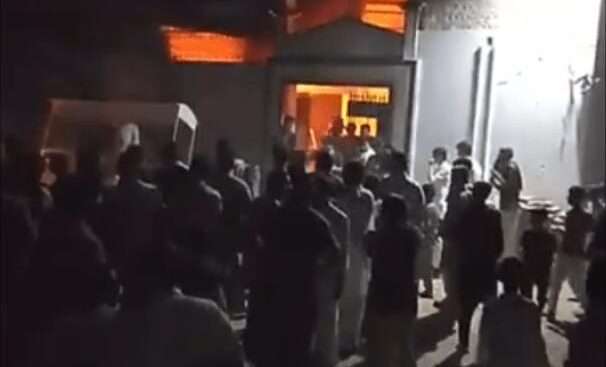On the very day Pakistan celebrated its 78th Independence Day, extremists turned the country’s streets into battlegrounds of hate. In Faisalabad’s Dijikot, two Ahmadiyya places of worship were set ablaze by a mob led by Tehreek-i-Labbaik Pakistan (TLP) leaders—an ugly reminder that in Pakistan, religious freedom remains an illusion.
According to police reports, more than 300 attackers, armed with rods and bricks, descended on Ahmadi worshippers under the cover of Independence Day processions. Their target: two mosques built decades before Pakistan criminalized Ahmadi worship in 1984. They tore down minarets, delivered fiery hate speeches, and torched the buildings while hurling stones at nearby Ahmadi homes. Families, including women and children, were terrorized; several were injured.
The Face of Pakistan’s Extremism
The mob was reportedly led by TLP ticket-holder Hafiz Rafaqat, exposing once again how mainstream extremist groups openly incite violence under political and religious banners. TLP, notorious for its violent street power, enjoys immunity in Pakistan’s political and judicial system, while minorities pay the price.
This was no spontaneous riot—it was organized terrorism, with cases now registered under the Anti-Terrorism Act, 1997 and multiple sections of the Pakistan Penal Code. Yet, history shows such cases rarely lead to real accountability. Arrests are made, but justice seldom follows, as extremist groups continue to act as untouchable power brokers.
A Dark Stain on “Independence”
Ahmadiyya community spokesperson Aamir Mahmood condemned the attacks:
“This is not the freedom Pakistan’s founders envisioned. Until those who commit such acts face justice, intolerance will grow.”
His words cut deep. While the nation waved flags in celebration, its minorities were reminded that they are second-class citizens—vulnerable, silenced, and unprotected by the state.
The State’s Complicity
The Human Rights Commission of Pakistan (HRCP) had only a day earlier warned about rising hate speech from clerics against non-Muslims. The warning was ignored. Police response was reactionary, not preventive. Even now, with 25 arrests made, officials refuse to confirm if those detained include the nominated suspects. The silence of Faisalabad’s police chief further reflects the institutional reluctance to confront extremism head-on.
The Pattern of Persecution
This is not an isolated incident—it is part of a systemic, decades-long campaign against Ahmadis and other minorities. From discriminatory laws to mob violence, the Pakistani state has allowed extremist ideologies to flourish unchecked. Every time the state bends to clerical power, it emboldens groups like TLP to dictate who belongs in the “Islamic Republic” and who does not.
Pakistan’s Moral Collapse
As the world watched Pakistan hoist its flag of freedom, mobs burned places of worship in its streets. This stark contradiction lays bare the country’s moral collapse: a state that claims to champion freedom but cannot guarantee the basic right to worship.
If Pakistan is to have any credibility as a modern nation, it must:
- Crush extremist groups like TLP rather than appease them.
- Enforce Supreme Court rulings against hate speech and mob violence.
- Protect minorities as equal citizens, not sacrificial pawns in a theocratic power game.
Until then, every Independence Day will remain a hollow celebration—where extremists chant victory while minorities count their dead, their wounded, and their burnt-down houses of prayer.
